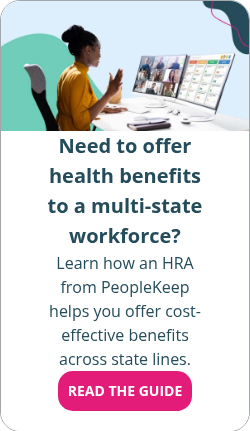How California's individual mandate affects you
By Holly Bengfort on July 29, 2025 at 6:00 AM
In recent years, California has taken steps to improve healthcare accessibility and affordability for its residents. One such measure is the implementation of an individual mandate, which requires all Californians to have health insurance coverage or face a penalty on their taxes.
In this article, we'll go over how the mandate works, who it applies to, and how to avoid potential tax penalties while staying covered.
In this blog post, you'll learn:
- Why it's important for California residents to have minimum essential coverage (MEC).
- Who is exempt from California's individual mandate.
- How employers can maximize health savings with a health reimbursement arrangement (HRA).
Overview of California's individual mandate
California established its healthcare mandate to stabilize and strengthen the state's healthcare system. It requires residents to have coverage under a health insurance plan. This initiative reduces the number of uninsured individuals and helps ensure that everyone has access to necessary healthcare services at an affordable rate.
The state modeled its individual mandate after the federal government's mandate in the Affordable Care Act (ACA). While the federal government ended penalties for the ACA individual mandate in 2018 as part of the Tax Cuts and Jobs Act of 2017, the California mandate remains in effect.
How does California's individual mandate affect you?
As of January 1, 2020, residents must either have qualified health plans with minimum essential coverage (MEC), obtain an exemption from the requirement, or pay the Individual Shared Responsibility Penalty when they file their state tax return.
To avoid a penalty, you need MEC throughout the year for:
- Yourself
- Your spouse or domestic partner
- Your dependents
Most people already have qualifying coverage through:
- Employer-sponsored plans
- Coverage purchased through Covered California1 or directly from insurers
- Medicare Part A
- Medicare Part C (Medicare Advantage plans)
- Most Medicaid plans
People without coverage can shop for health insurance policies through California's state exchange during the annual Open Enrollment period. You may also be eligible for a special enrollment period if you experience a qualifying life event.
What are the penalties for individuals who fail to obtain insurance?
If California residents don't have qualified health insurance coverage for every month of the year, they face a penalty when they file their income tax returns.
The penalty is the higher of either2:
- A flat amount, based on the number of people in the tax household. You pay $900 per adult and $450 per child.
- A percentage of the household income. You pay 2.5% of the amount of gross income that exceeds the filing threshold requirements based on your tax filing status and number of dependents.
You can use the penalty estimator tool3 provided by the State of California Franchise Tax Board to determine what you may owe.
California residents who are exempt4 from penalty assessments include:
- People who claim religious conscience exemption
- People who claim affordability hardship exemptions or general hardship exemptions
- People who have an income below the tax filing threshold
- Members of a healthcare sharing ministry
- Members of federally recognized Indian tribes, including Alaskan Natives
- Incarcerated individuals
- People who have a short coverage gap of three consecutive months or less
- People offered health coverage that's considered unaffordable
- Those enrolled in a limited or restricted-scope Medi-Cal program or another form of coverage from the California Department of Health Care Services
To apply for an exemption, you can visit Covered California's website.
How must employers comply with the individual mandate?
If you're an employer who offers a fully insured group health policy, your health insurance company should report health coverage information to California's Franchise Tax Board by the March 31 filing deadline. Otherwise, they'll face a penalty.
If your insurance carrier doesn't file the required information, or if you offer a self-insured health plan, you must report insurance information by March 31. This requirement is a result of the Individual Shared Responsibility Penalty, which the state government enacted alongside the health insurance mandate.
Employers can file the following forms electronically or by mail:
- IRS Form 1094-B
- IRS Form 1095-B
- IRS Form 1094-C
- IRS Form 1095-C
Federal requirements for applicable large employers (ALEs)
Under the ACA's employer mandate, applicable large employers (ALEs), or those with 50 or more full-time equivalent employees (FTES), must offer MEC to at least 95% of their full-time workforce and their dependents. Coverage must meet minimum value (MV) and MEC and be affordable for the employee. Otherwise, they may be subject to the employer shared responsibility provision (ESRP) penalties.
The following locations also have individual mandates:
- District of Columbia
- Massachusetts
- New Jersey
- Rhode Island
- Vermont
These locations, excluding Vermont, have penalties in place for residents who fail to comply with the health insurance mandate.
How can employers offer budget-friendly health benefits?
If you're struggling to keep up with the skyrocketing prices of employer-sponsored group health plans, a stand-alone health reimbursement arrangement (HRA) is the right solution for your budgetary needs.
With an HRA, employers can reimburse their employees tax-free for more than 200 qualifying healthcare costs, including individual health insurance premium payments. This affordable coverage option allows you to set your own budget. It also helps your employees meet the individual mandate for California and avoid a tax penalty.
Two of the most popular stand-alone HRAs are:
- The individual coverage HRA (ICHRA): The ICHRA works for employers of all sizes. The ICHRA offers the most flexibility since it doesn't come with contribution limits. You can offer your employees as much as you want as an allowance. You can also vary allowances using employee classes, such as full-time employees and part-time employees. You can also differ allowances by employee age and family size. Employees need individual health insurance policies to participate in the ICHRA.
- The qualified small employer HRA (QSEHRA): The QSEHRA is only for small businesses with fewer than 50 FTE employees. The QSEHRA doesn't offer employee classes, but you can still differ allowances based on employee age and family size. It also has annual contribution limits. However, employees don't need individual health insurance policies to participate in the QSEHRA. They can also have traditional group health coverage through a spouse's or parent's plan.
With PeopleKeep by Remodel Health, you can offer a QSEHRA or ICHRA that fits your business needs. Offering an HRA creates an SEP for your employees to enroll in Marketplace insurance, thereby satisfying the state’s individual mandate.
Conclusion
The California individual mandate has a direct impact on residents of the state. Employees need health insurance coverage, and employers must report on the coverage status of their employees. Understanding the implications of the individual mandate and taking appropriate action will ensure that you comply with the state law and have access to the healthcare you need.
This article is for informational purposes only. PeopleKeep by Remodel Health doesn’t provide tax or legal advice. Always consult with a tax professional for proper guidance.
This blog article was originally published on April 7, 2020. It was last updated on July 29, 2025.
Check out more resources
See these related articles

The Covered California Individual Health Insurance Experience
Individuals across California have reported smooth transitions to individual health insurance under Covered California.

California Health Insurance Exchange Guide
The California Health Insurance Exchange, Covered California, will open in October 2013 as part of Affordable Care Act (ACA).

How to calculate FTEs to determine ALE status
Learn what a full-time equivalent employee (FTE) is, what your FTE number means if you’re an ALE, and how to calculate how many FTEs you employ.



